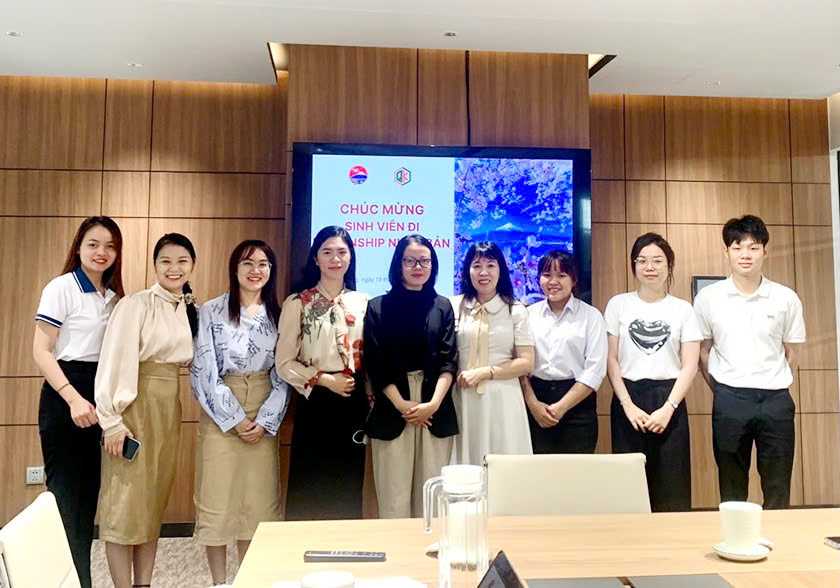Returning Home for a Warm Tet After a Meaningful Internship in Japan
After a year-long meaningful internship under the "Japan Internship Program" at Intercontinental Hotel in Iwate Prefecture, Japan—organized by Duy Tan University and the Japan Internship Support Association (JISA)—Nguyen Thi Thuy Vy, a final-year student majoring in English Translation and Interpretation at the Faculty of English, School of Language & Social Humanities (LHSS), Duy Tan University, has returned home just in time to celebrate a warm Tet Ất Tỵ with her family.
Not only did she bring back invaluable experiences from Japan, but Thuy Vy also proved to be the perfect model of a "golden child" by bringing home more than 150 million VND, saved from her accumulated salary during the internship. On this special occasion, let's hear some interesting insights from this talented and determined young woman!

Interviewer (PV): Hello Thuy Vy! We heard that you returned to Da Nang on January 20, 2025, just in time to prepare and celebrate the New Year with your family. How was this Tet different from previous years?
Thuy Vy: After a year away from home, I really missed my parents, my loved ones, my friends, and Da Nang City. As the saying goes, "No gift is greater than family reunion, and no Tet is as joyful as a reunited Tet," I had a truly warm and love-filled holiday with my family. Returning home after such a long journey made me cherish every moment with my loved ones even more.
PV: Doing an internship abroad is a rare opportunity, especially a paid one. Could you share some tips on how you secured this opportunity with fellow DTU students?
Thuy Vy: My year-long internship at Intercontinental Hotel (Japan) was an invaluable experience. When I first learned about the "Japan Internship Program" through our class group chat, I immediately signed up because I was eager to explore new experiences. I had three months to prepare, during which I researched Japan, my workplace, the company culture, and the job requirements. The online interview was quite intense, but I put in my best effort and was overwhelmed with joy when I received the acceptance notice.
PV: At Intercontinental Hotel, which department did you intern in? What differences did you notice between Japanese and Vietnamese work environments?
Thuy Vy: I arrived in Japan on January 23, 2024, and had five days to rest, go shopping, and complete paperwork. As a hotel intern, I had the opportunity to work in various departments, including front desk, restaurant, and housekeeping—the latter being where I spent the most time.
After six months, my colleagues and I were trained to become leaders or support leaders, leading teams and assisting Japanese leaders.
My job required good physical health, basic Japanese communication skills, and English as an advantage when assisting international guests. This year-long experience in Japan taught me discipline, diligence, and professionalism. While there are differences between Japanese and Vietnamese work cultures, there are also similarities. I was delighted to find that my Japanese supervisors and colleagues were friendly and treated foreign employees equally. As long as you work seriously and diligently—even voluntarily taking overtime—you will be highly regarded.
PV: What was your daily life like in Japan?
Thuy Vy: My day usually started at 6:30 AM, and I worked at the hotel from 8:00 AM to 5:00 PM. In the evenings, I would go to the gym, cook, study, or watch movies. I had two days off per week, which I used for outings or simply relaxing.
PV: What impressed you most about Japanese culture? And what is your favorite Japanese dish?
Thuy Vy: The aspect of Japanese culture that impressed me the most was their seriousness and discipline. Even at Intercontinental Hotel, where I interned, people would chat cheerfully before work, but once they started, they were completely focused. What stood out to me was that even when mistakes occurred, feedback was always given gently, without raising voices.
Japanese cuisine is incredibly diverse, and not only I but also other foreigners loved it. Personally, I adore Udon noodles and Sashimi so much that I could eat them every day instead of rice (laughs).
PV: We heard that after completing your internship in Japan, you brought back 150 million VND. Could you share how you managed your finances during your internship?
Thuy Vy: This was actually my goal from the beginning. I made sure to maintain good health so I could work overtime if needed. Thanks to my willingness to put in extra hours, I managed to save a considerable amount, which, for me, is quite significant at this stage.
My family was proud to see me working hard and managing my finances wisely. Not only my family but also my professors and friends congratulated me when I completed my internship and returned home. Receiving heartfelt messages and warm congratulations made me truly happy.
PV: How did this one-year internship in Japan influence your career direction?
Thuy Vy: Before, I was uncertain about my career path because my major offers many job opportunities, and I wasn't sure which role would best suit my strengths and weaknesses. This internship not only provided me with professional training but also helped me gain clarity about my future career.
If given the chance, I would love to return to Japan to continue studying and working, as it truly is a "land of opportunity" for living, learning, and growing. The Japanese people's civility, hospitality, and diligence are qualities I deeply admire.
PV: Do you have any advice for students considering an internship in Japan?
Thuy Vy: As I mentioned, interning in Japan is an incredibly valuable experience. If you have the chance, be bold and go for it! I believe that once you step foot in Japan, you'll gain a wealth of knowledge and skills, make great friends, and create unforgettable memories.

- Effective Strategies to Improve English Listening Skills
- AN AGREEMENT WITH THE UNIVERSITY OF MINNESOTA CROOKSTON, USA
- DANH SÁCH SINH VIÊN THAM DỰ TỐT NGHIỆP & DANH SÁCH SINH VIÊN CÔNG NHẬN TỐT NGHIỆP NGÀNH NGÔN NGỮ ANH
- DTU Hosts 2nd Annual Student Research Conference for Economics and Social Sciences Cluster
- DTU English Faculty Hosts Internship Connect Event

